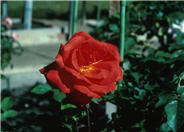
Common name:Japanese Boxwood
Botanical name:Buxus microphylla japonica
Japanese Boxwood is often used as a hedge. It is compact, with small bright green leaves. It can reach 4-6' tall and wide or be kept smaller through pruninig. It can be sheared to shape. It does better in areas with milder winters. It prefers full sun and a moderate amount of water.

Common name:Waxleaf Privet
Botanical name:Ligustrum japonicum 'Texanum'
This dense, evergreen shrub reaches 6'-8' tall and 4'-6' wide. Waxleaf Privet has dark green, leathery, evergreen leaves that make a great privacy hedge. White fragrant flowers bloom in spring and summer. Bees love these flowers! Blue black berries follow bloom season. Part of this shrub may be poisonous if ingested. It prefers full sun to light shade with a medium amount of watering, more in hot summer months.

Common name:Rose selected cultivars
Botanical name:Rosa species
These shrubs and vines are the most-loved in the West and are very resilient. They come in a wide variety of sizes and colors and are easy to maintain with proper care. Roses can be espaliered or used on a trellis or as shrubs along walkways. Some are fragrant; most have thorns.

Common name:Olive, Edible Olive
Botanical name:Olea europaea
This broad tree will slowly grow to 25'-30' tall and wide. It has small, grey-green, evergreen leaves. Small white fragrant flowers bloom in spring, followed by fleshy black fruit that appears in fall. Fruit is messy and can stain sidewalks. There are cultivars that do not produce fruit. Some folks are allergic to the blooms. This tree is very long lived, with a beautiful gnarled trunk. It prefers full sun and low watering in summer months (twice a month) and none during the winter, when established.
| Designer: Amy Bartell | Rose Court |
Photographer: GardenSoft |
Soils and Compost:
Practice grass-cycling by leaving short grass clippings on lawns after mowing, so that nutrients and organic matter are returned to the soil.
Water Saving Tip:
Check your irrigation controller once a month, and adjust as necessary.
Most plants require only one-third as much water in winter as they do in summer.
Integrated Pest Management:
Attract, or buy beneficial insects such as ladybugs and lacewings to control pest outbreaks in your garden.
